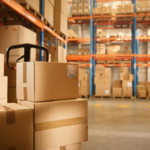
Meta Description: Discover the key tactics to source reliable wholesale suppliers for your Amazon FBA business. Learn what to consider and how to choose your partners to build a successful e-commerce business with quality products.
The difference between a successful and a struggling Amazon business often boils down to the products you choose. It’s all about finding profitable products with good margins.
And at the heart of this lies the choice of the right Amazon FBA wholesale suppliers. But how do you go about finding this perfect match? How do you research and source your products effectively? All these questions find their answers in this article. Let’s dive in and unlock the keys to a thriving Amazon venture.
Let’s start with FBA Amazon meaning. FBA is a service provided by Amazon that takes care of the storage, packing, and shipping of products on behalf of sellers. This means that once you’ve sourced your products and shipped them to Amazon’s fulfillment centers, they handle the rest. From customer service to returns, Amazon’s got it covered.
Embarking on an Amazon FBA journey? Choosing the right suppliers is a cornerstone of success. Here are seven key criteria to guide you in making informed decisions.
1. Reliability and Reputation
Look for suppliers with a solid reputation for consistent and dependable service. Reviews and testimonials can be valuable indicators of their reliability.
2. Product Quality
Prioritize suppliers that deliver high-quality products. Request samples to assess their standards, ensuring they align with what Amazon customers expect.
3. Price Competitiveness
Balance cost with quality. While lower prices are attractive, be cautious of excessively low offers that may compromise product integrity.
4. Minimum Order Quantity (MOQ)
Ensure the supplier’s MOQ aligns with your business model and sales projections. Avoid overly high requirements that might lead to excess inventory.
5. Communication and Responsiveness
Effective communication is key. Choose suppliers who respond promptly and clearly to inquiries and concerns. This helps prevent misunderstandings and delays.
6. Location and Shipping
Consider the supplier’s location in relation to your target market. Closer proximity can lead to shorter shipping times and potentially lower transportation costs.
7. Compliance and Certifications
Verify that the supplier adheres to industry standards, safety regulations, and legal requirements. This step is essential for avoiding potential legal and quality issues.
If you don’t sharpen your product research skills, you might miss out on great opportunities. For Amazon sellers looking for suppliers worldwide, here are some simple tips to find the perfect match for your products.
1. Define Your Niche
Before diving into the world of wholesale suppliers, it’s crucial to define your niche. What type of products are you interested in selling? Consider your passions, interests, and market trends. This will serve as a compass, guiding your supplier search.
2. Conduct Market Research
Thorough market research is the cornerstone of a successful FBA venture. Use tools like SellerSonar or even Amazon’s own Best Sellers list to identify high-demand products within your chosen niche.
3. Attend Trade Shows and Expos
Trade shows and expos are goldmines for connecting with potential wholesale suppliers. They offer a platform to meet suppliers face-to-face, inspect product quality, and establish meaningful relationships.
4. Utilize Wholesale Directories
Online wholesale directories like Alibaba, ThomasNet, and SaleHoo provide extensive lists of suppliers across various industries. Filter results based on your niche and start contacting potential partners.
5. Vet Your Suppliers
Once you’ve identified potential suppliers, it’s essential to vet them thoroughly. Look for red flags like inconsistent communication, unverifiable contact information, or suspiciously low prices.
6. Request Samples
Before committing to a wholesale partnership, request samples of the products you intend to sell. This allows you to evaluate their quality, ensuring they meet the standards expected by Amazon customers.
7. Negotiate Terms
Engage in open and transparent negotiations with your chosen suppliers. Discuss pricing, minimum order quantities, lead times, and payment terms. Building a mutually beneficial relationship sets the foundation for long-term success.
8. Ensure Compliance
Make sure your chosen suppliers adhere to Amazon’s policies and standards. This includes compliance with product quality, safety regulations, and intellectual property rights.
9. Build Strong Relationships
A successful FBA venture hinges on strong relationships with your suppliers. Maintain open lines of communication, fulfill your commitments, and be responsive to their needs. A healthy partnership can lead to exclusive deals and mutual growth.
Amazon FBA opens doors to a world of possibilities for e-commerce entrepreneurs. By understanding the essence of FBA and mastering the art of finding reliable wholesale suppliers, you set the stage for a thriving e-commerce venture. Remember, success in FBA is not just about finding products; it’s about building enduring partnerships that fuel growth and prosperity. Happy selling!
Alexia is the author at Research Snipers covering all technology news including Google, Apple, Android, Xiaomi, Huawei, Samsung News, and More.